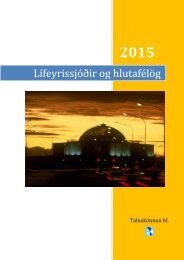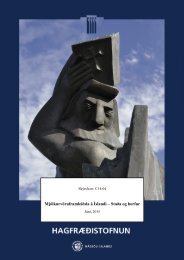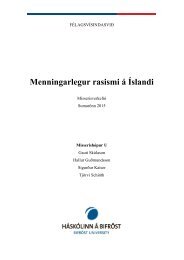You also want an ePaper? Increase the reach of your titles
YUMPU automatically turns print PDFs into web optimized ePapers that Google loves.
WORLD REPORT 2016<br />
HUMAN RIGHTS WATCH<br />
for the stated purpose of deterring Central American migrants from crossing into<br />
the US from Mexico. The Obama administration has since backed away from that<br />
rationale of deterrence in custody determinations for individual cases. Nevertheless,<br />
it continues to argue in federal court that it requires the family detention<br />
system to deter further mass migration.<br />
Thailand’s immigration laws permit the indefinite detention of all refugees, including<br />
Rohingya and members of other ethnic groups from Burma, ethnic<br />
Uighurs from China, Pakistanis, and Somalis. Migrant children are held in<br />
squalid cells without adequate food or opportunity to exercise or receive an education.<br />
Children have told Human Rights Watch that immigration detention centers<br />
can be so crowded they must sleep upright. One mother said there were<br />
three toilets for 100 detained migrants, which her teenage daughter would avoid<br />
using because they had no doors.<br />
Elsewhere in the world, Human Rights Watch and other groups have documented<br />
large-scale detention of migrant children in Indonesia, Malaysia, and Mexico.<br />
Detention in the Name of National Security<br />
Children deemed to be a security threat may be held under administrative or military<br />
detention, which have fewer checks than criminal and juvenile justice systems.<br />
Such children include captured, surrendered, or demobilized child soldiers,<br />
even though international standards call for states to treat them primarily as victims<br />
and offer them rehabilitation. Children have been held in large numbers in<br />
Afghanistan, Democratic Republic of Congo, Iraq, Somalia, and Syria for alleged<br />
association with armed or extremist groups. The special representative of the UN<br />
secretary-general for children and armed conflict, Leila Zerrougui, expressed<br />
concern that children were detained for alleged involvement with armed groups<br />
in 17 of the 23 situations covered in her 2014 report.<br />
Each year, Israel arrests, detains, and prosecutes in the military court system<br />
some 500 to 700 Palestinian children suspected of criminal offenses in the occupied<br />
West Bank, according to Defence for Children International/Palestine Section.<br />
Israel is the only country that automatically prosecutes children in military<br />
courts. In 2015, Human Rights Watch found that Israeli security forces used un-<br />
necessary force to arrest or detain Palestinian children as young as 11 in East<br />
Jerusalem and the West Bank, and have choked, beaten, threatened, and interrogated<br />
children in custody without parents or lawyers present.<br />
Other countries also prosecute some children in military courts. In Egypt, for example,<br />
some of the dozens of children arrested in the last two years for political<br />
offenses have been tried in military courts.<br />
Detention in the Name of Treatment or Care<br />
Children are also detained in the name of “treatment” or “rehabilitation” from<br />
drug dependence or as a misguided means of managing disabilities.<br />
In Cambodia, eight drug detention centers hold about 1,000 people at any one<br />
time. According to the last government figures made public, at least one in 10 is<br />
a child under the age of 18. Children face the same abuses as adults while confined,<br />
including cruel, inhuman and degrading treatment and even torture.<br />
Romchoang was under age 18, for example, when he was held in a military-run<br />
drug detention center in Koh Kong province for 18 months. He was locked in a<br />
room, chained to a bed for the first week, and later made to perform physical exercises<br />
each morning. Soldiers, who beat him if he fell asleep, told him sweating<br />
would help him recover from drugs.<br />
Laos and Vietnam also operate drug detention centers that hold large numbers<br />
of children; in Vietnam, detained children and adults are subjected to forced<br />
labor, beatings, and torture. In fact, the rationale for such drug detention centres<br />
is to lock up and punish the poor and marginalized. In Cambodia, these centers<br />
hold “street children” who do not use drugs but who are picked up and detained<br />
in operations to “clean the streets.” Similarly, Lao authorities use the Somsanga<br />
detention center, which has received direct support from the US embassy in Vientiane<br />
in recent years, as a dumping ground for street children and others considered<br />
socially undesirable.<br />
Elsewhere in the world, street children are frequently rounded up and detained<br />
arbitrarily, sometimes under vaguely worded criminal laws.<br />
Many countries lock up children with disabilities, ostensibly for their care, but in<br />
reality due to a lack of community services and support for families. In Russia,<br />
46<br />
47










